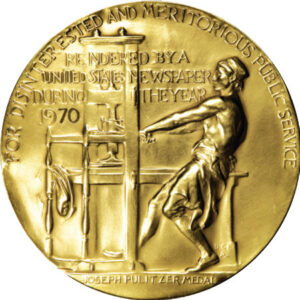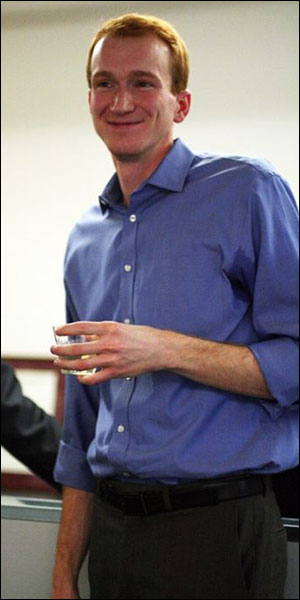Missouri Journalism Master’s Graduate Chris Hamby Earns Pulitzer Prize for Investigative Reporting

Two Alumni Share Washington Post-The Guardian U.S. Prize for Public Service
By Gwen Girsdansky
Master’s Student
Columbia, Mo. (April 21, 2014) – An alumnus of the Missouri School of Journalism has been awarded a 2014 Pulitzer Prize, the highest honor given for U.S. journalism.
Chris Hamby, MA ’10, received the medal in the investigative reporting category for “Breathless and Burdened,” a series that exposed the systematic denial of benefits for coal workers with black lung disease.
In addition, two alumni, Jeff Leen, MA ’82, and Steven Rich, MA ’13, were members of The Washington Post team led by Bart Gellman that shared the Pulitzer Prize for Public Service with a team from The Guardian U.S. They covered the NSA surveillance reports based on the leaks of Edward Snowden.

The citation for the “Breathless and Burdened” series cites Hamby “for his reports on how some lawyers and doctors rigged a system to deny benefits to coal miners stricken with black lung disease, resulting in remedial legislative efforts.”
The series grew, Hamby said, out of a previous Center for Public Integrity investigation into the increasing number of black lung cases. However, it became apparent that there was also a story about how the coal miners with the disease, or their widows, were being systematically denied benefits. Thus started a yearlong investigation that focused on the law firm Jackson Kelly, which serves the coal industry, and Johns Hopkins Medical Institutions, one of the most respected hospitals in the country.
Hamby used the skills he learned at the Missouri School of Journalism and the National Institute for Computer-Assisted Reporting (NICAR, headquartered at the School) to build databases from thousands of legal documents. These showed that Jackson Kelly was withholding documents that would have proven the coal miners had black lung disease and were entitled to benefits. Hamby also was able to show that the firm’s lawyers were not denying they had the documents, but were arguing time and time again they were allowed to.
At the beginning, the situation was complex and complicated.
“It’s like a puzzle, and you don’t realize that there’s a missing piece,” Hamby said.
But eventually he discovered pieces were missing and where to find them. Hamby became well-versed in the legal and medical system to understand the dynamics at play and translate them into laymen’s terms for readers. In addition, Hamby also worked to move away from “he said-she said” reporting that can be popular in journalism and forces readers to determine who is right. Although time consuming, Hamby was able to present the information as fact with limited attribution because he was hearing the same information from different sources so frequently, and documents and data painted a clear picture.

“I think our job is to determine, as close as we can, what is true,” Hamby said.
However, Hamby also realized there needed to be a human component to his work. The first installment focused on the story of Gary Fox, a coal miner from West Virginia, who had died three years before the investigation began.
“His widow and daughter were really brave and forthcoming in such a horrible situation,” he said.
The combination of data and anecdotes created compelling narratives that led to a congressman calling for a federal investigation into black lung benefits and the suspension of Johns Hopkins’ black lung program.
Hamby’s winning series of reports, “Breathless and Burdened,” have been compiled in a Reynolds Journalism Institute Digital Newsbook produced by RJI’s technology pioneer Roger Fidler.
In mid-April, days after winning his Pulitzer, Hamby accepted a new position with the BuzzFeed investigative unit. The media website, best known for promoting viral content, introduced an investigative unit in fall 2013. Hamby said he looks forward to continuing probing into the intersection of vulnerable populations and powerful organizations.
Hamby’s Pulitzer win follows a string of top awards earned while a student at the School. He received first place in the Best Breaking News Story category in the 2011 Missouri Press Association‘s Better Newspaper Contest. The judges said of “Key Witness Recants in Ryan Ferguson Case,” published in the Columbia Missourian, “a lot of good work here, pulling together a nine-year-old case and getting all of the facts into the context of the convicted man’s new claims. Nicely done.”
Hamby was the 2009 Society of Professional Journalists National Mark of Excellence Award winner in the non-fiction magazine article category. The story, “Keeper of the Court,” was published in Vox Magazine. His master’s project, “The Ryan Ferguson Case: An Examination of a Strange Murder and Conviction,” was an investigation of a wrongful conviction for a notorious murder. This work later ran as a two-part series in The Kansas City Star, and the subject of the stories won his freedom in 2013.
Databases Fuel Pulitzer Win by Washington Post and The Guardian U.S.
Much like Hamby’s investigation, the Washington Post and The Guardian U.S.’s coverage of National Security Agency spying was heavily reliant on documents provided by databases.

Two Missouri School of Journalism alumni were members of The Washington Post team led by Bart Gellman that shared the Pulitzer Prize for Public Service with a team from The Guardian U.S.: Jeff Leen, MA ’82, the assistant managing editor of investigations, and Steven Rich, MA ’13, database editor for investigations.
The citation for the Washington Post-The Guardian U.S. noted their “revelation of widespread secret surveillance by the National Security Agency, marked by authoritative and insightful reports that helped the public understand how the disclosures fit into the larger framework of national security.”
Leen, who was the lead editor during the initial phase, said that this coverage was different from anything else he had done because it was at the intersection of breaking news and investigations.
“Usually with super complex stories with highly sensitive information, you have the time to sort it out, but we were also trying to break these stories as quickly as possible,” Leen said.

He said that documents were often cryptic and since no one had heard of these systems before, they couldn’t just turn to Google or Wikipedia to learn more.
Among the reporters who helped decipher the thousands of documents that were leaked was Rich, who had been an employee for about a month when the story broke. He was able to help determine how close the government was to developing a quantum computer and how the NSA was identifying users on what is supposed to be anonymous browsing.
Both Leen and Rich cited the necessity of teamwork to produce quality journalism. Those in the legal department determined which documents to publish. The graphics team added visual elements to help the readers.
“The best journalism is done in teams that are very unselfish,” Rich said.
For Leen, this was the eighth Pulitzer Prize-winning team he has been a part of and said that this one was special because it was the Pulitzer for public service reporting.
“It’s our highest mission,” Leen said. “It makes it extra special. It’s the entire newspaper doing great work for the public.”
Leen received the Missouri Honor Medal for Distinguished Service in Journalism in 2012. As a master’s student, Leen did a stint in the School’s Washington reporting program where he covered Congress, the Supreme Court and federal agencies.
For Rich, the Pulitzer follows on the heels of another team recognition, the Local Accountability Reporting Award in the 2014 American Society of News Editors competition. Rich’s master’s project was on how journalists report on money in politics. He completed it while interning for Leen on the Post’s investigations unit.
Updated: July 24, 2020
Related Stories
Expand All Collapse All- 2021
-
2020
- Aug 27, 2020 Missouri School of Journalism's Watchdog Writers Group announces first fellows and student reporters
- Jun 25, 2020 11th Hour Project awards $1.1 million, 3-year grant to the Journalism School's fellowship program Watchdog Writers Group
- May 08, 2020 Missouri School of Journalism student receives Outstanding Discovery Fellows award for undergraduate research
-
2019
- Jul 24, 2019 Missouri School of Journalism Launches New Investigative Fellowship Program To Support Authors
- Jun 04, 2019 Hands-On Investigative Reporting Project Leads Missouri Attorney General to Launch New Probe
- Jan 28, 2019 NewsPro names Associate Professor Mark Horvit a 2019 Noteworthy Journalism Educator
-
2018
- Dec 06, 2018 Senior Kaitlin Washburn Receives $1,000 Jane Geisse Scholarship in Investigative Reporting
- Nov 12, 2018 Senior Claire Mitzel Awarded $2,500 Homer L. Hall Scholarship
- Aug 20, 2018 Jamie Grey Nominated for Emmy in the Crime/Single Story/Series Category
- Jun 29, 2018 Workshop Equips High Schoolers with Investigative Reporting Skills
-
2017
- Nov 06, 2017 Investigating Success
- Mar 30, 2017 Senior Lucille Sherman Named National Intern at GateHouse Media
- Mar 23, 2017 Kara Tabor Wins 2017 Google News Lab Fellowship
- Mar 15, 2017 KOMU Student's Story on School Choice Takes Her to Indiana for Research
- Feb 03, 2017 Stephanie Sierra Wins First Place Hearst Award for Broadcast Features
- Jan 24, 2017 Senior Ruth Serven Wins Pulliam Fellowship with the Indianapolis Star
-
2016
- Dec 17, 2016 Student Project on Pulitzer-Winning Work Captures Attention of Professionals
- Dec 14, 2016 DC Philanthropists Fund Missouri Journalism Fellowship for Indian Reporter
- Nov 02, 2016 Alumna to Share Inner Workings of Investigative Journalists
- Oct 19, 2016 Recent Graduate Wins First Place in Religion Reporting Competition
- Sep 08, 2016 School to Join National Reporting Network for 2016 Election
- Aug 30, 2016 Alumna Who Led Panama Papers Project Wins International Award
- Jul 12, 2016 Insights on Internships: 5 Questions with Riley Beggin
- May 10, 2016 Alumna Leads 'Panama Papers' Investigation, Shares Project with Students
- Apr 18, 2016 Science, Environmental Journalism Group to Host National Geographic Speaker
- Apr 07, 2016 Asian-American Journalists Association Students Interview Lead Investigative Editor
- Mar 24, 2016 Mark Horvit to Lead School's State Government Reporting Program
- 2015
- 2014
-
2013
- Aug 14, 2013 A Record Breaker: Missouri School of Journalism Faculty, Students and Alumni Present 114 Papers at International Conference; 11 Earn Top Paper Awards
- May 09, 2013 7 Missouri Journalism Graduate Students Attend the White House Correspondents' Association Dinner
- May 06, 2013 Missouri Journalism Alumna Elizabeth McGowan Wins Pulitzer Prize for National Reporting
- Apr 16, 2013 Master's Student Adds 'Pulitzer Prize' to His Resume
- Apr 03, 2013 Master's Student Steven Rich Chosen for Nationally Acclaimed News21 Program
- Jan 09, 2013 2 Missouri Journalism Students among the 12 Selected for the National Sports Journalism Institute
- 2012
- 2011
-
2010
- May 10, 2010 4 National Winners, 4 National Finalists in the SPJ Mark of Excellence Awards
- May 06, 2010 The Missouri School of Journalism to Recognize 538 Graduates at Commencement on May 15
- Apr 28, 2010 Alumna Barbara Laker, BJ '79, Wins the Pulitzer Prize for Investigative Reporting
- Apr 13, 2010 Missouri School of Journalism Students Earn Bragging Rights at SPJ Regional Conference with 25 Mark of Excellence Awards
- Mar 15, 2010 Missouri Journalism Student Advances to Semifinals of International YouTube/Pulitzer Video Journalism Competition
- Feb 17, 2010 Yves Colon, MA '90, Serves Haitian Radio Audience Recovering from Recent Earthquake
- 2008
- 2007
- 2006
- 2005
- 2004
- 2003